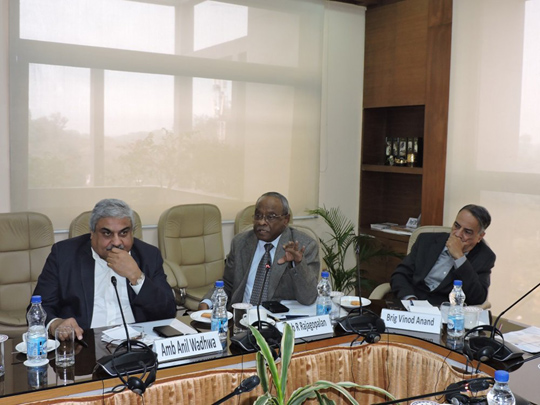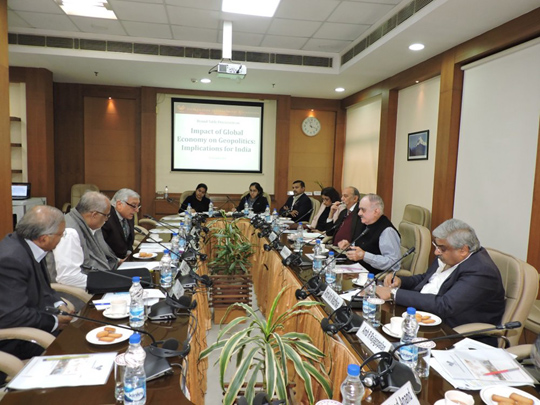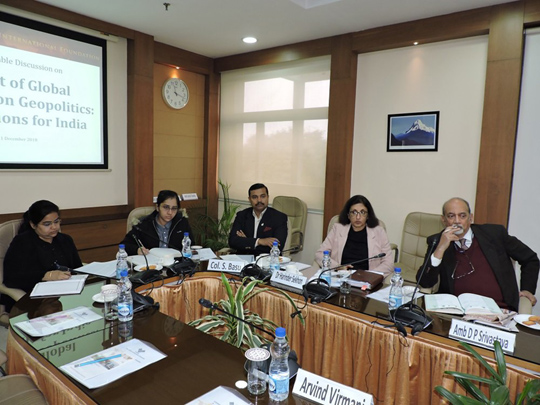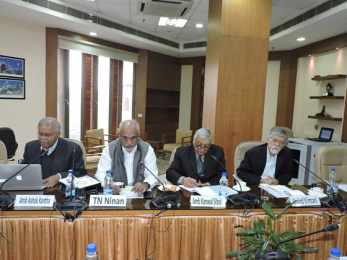A Panel Discussion at the Vivekananda International Foundation (VIF) was organized on December 11, 2018, on the subject of ‘Impact of Global Economy on Geopolitics: Implications for India’. The panel comprised of eminent economists - Dr Arvind Virmani and Mr TN Ninan - and former senior diplomats - Ambassador Kanwal Sibal and Ambassador Ashok Kantha.
The discussion deliberated on many issues and raised many salient points, as described in the following paragraphs.
Rising Inequality and Failure of Globalization
 The aggressive rise of social media and consequent increased global awareness has led to differing narratives on the benefits of an integrated, global economy. Inequality in both income and opportunities have been the driving factor for rise of right-wing nationalism, populism, supremacism, protectionism etc. in many countries.
The aggressive rise of social media and consequent increased global awareness has led to differing narratives on the benefits of an integrated, global economy. Inequality in both income and opportunities have been the driving factor for rise of right-wing nationalism, populism, supremacism, protectionism etc. in many countries.
Role of Trump Administration’s ‘America-First’ Policy
Donald Trump’s election to US presidency in 2016 has become a watershed event in the global economic timeline. United States position as both the preeminent world economy and largest world military, significantly impacts the intertwining of geopolitics and global economy. Trump’s reversal from US policies towards ensuring ‘global good’ to outright nationalism of ‘America-First’ has had reverberating effects in the current global milieu. There has been blatant politicization of the role of dollar as global currency.
Global Trade Slowdown
 Global Trade is no longer the lead engine for the global economy. The current global economy is not only facing short-term cyclical slowdown, but is also on a declining slope supply chains. As mentioned by Prime Minister Modi, India will need to double its exports to achieve double digit growth to be able to enter the USD 5 of long term cycle. Further, the US’ efforts at partial trade decoupling with China has created problems for economies interconnected with China-based trillion GDP club.
Global Trade is no longer the lead engine for the global economy. The current global economy is not only facing short-term cyclical slowdown, but is also on a declining slope supply chains. As mentioned by Prime Minister Modi, India will need to double its exports to achieve double digit growth to be able to enter the USD 5 of long term cycle. Further, the US’ efforts at partial trade decoupling with China has created problems for economies interconnected with China-based trillion GDP club.
Weakening of International Financial Institutions
China’s Belt and Road Initiative has brought the failure of global financial institutions regarding developmental lending into spotlight. Further, Trump’s desire to renegotiate the entire spectrum of US’ bilateral, regional and multilateral linkages with the global economy has put tremendous pressure of reform on World Trade Organization, International Monetary Fund and World Bank.
Oil and Gas Geo-politics
 With the US itself becoming a major oil and gas producer, the Organization of the Petroleum Exporting Countries (OPEC) is no longer in position to enforce pricing mechanisms. There has been a surge in US sanctions against major rival oil and gas producers such as Iran and Russia. To ensure sustainable development while also countering its rising energy bill, India will have to focus on its renewable energy targets such as solar energy.
With the US itself becoming a major oil and gas producer, the Organization of the Petroleum Exporting Countries (OPEC) is no longer in position to enforce pricing mechanisms. There has been a surge in US sanctions against major rival oil and gas producers such as Iran and Russia. To ensure sustainable development while also countering its rising energy bill, India will have to focus on its renewable energy targets such as solar energy.
Rise of China - No Rules or New Rules
China’s ambitions with clearly laid timelines through policies such as the Belt and Road Initiative have had massive repercussions for the global order, be it in the maritime, economic, diplomatic, technology or military domain. However, viability of its rapid growth with debt-binge is now under doubt, and the Chinese Communist Party still controls three-quarters of all rents and taxes in China.
Trump’s Policy on China
Since the 19th National Congress of the Communist Party of China, the global situation has changed to China’s disadvantage. Xi Jinping articulated the idea of moving China to the center-stage but in due course, the pushback has become more evident in the last few months. The US endorsement of the Indo-Pacific concept can be said to be directly related to the rise of China. The change of US policy towards China is much visible in the recent US official pronouncements. After the December meeting between Xi Jinping and Donald Trump on the sidelines of G20 in Argentina, the US is now pushing for structural changes in the Chinese economy. Trump’s China policy with bipartisan support is now becoming mainstream.
US-China Trade War
The US-China Trade War is essentially a power struggle. The trade might be a side issue and technology may be a bigger issue. Partial decoupling between the US and China in the technology sector may be imminent. In fact, the detention of Meng Wangzhou is not accidental, it’s a way of putting pressure on China. With the Chinese economy already going through a rough patch, the trade war raises worries of hastening an eventual meltdown. There has also been significant changes in the overall US-China strategic contestation. The concept such as ‘New Type of Great Power’ seems to be fading away. There is also contestation within China on the way it is handling the US-China trade contestations. There is a growing narrative that Xi Jinping may have overreached in taking the US head-on.
Multipolarity or Multipolar Transition
Despite the US’s prime role in ensuring global security and the global economic interdependency on China, there has been an international hesitance to pick sides. However, the US-China contestation has opened up space for other countries. There have been much more adjustments in China’s policy towards Japan, Korea and India. This was evident in the recent visit of Shinzo Abe to China and the Wuhan summit between Xi Jinping and Narendra Modi.
Issue of Technology Transfers
While the US is clamping down on technology transfers to China, questions are raised whether that would include clamping down transfers even to India. India does not have a significant R&D culture and much of the efforts are too dispersed to have major impact on Indian economy.
Future of Belt and Road Initiative (BRI)
India is no longer seen as the outlier regarding its position on the BRI. China will organize a second BRI Summit in 2019. However, with the debt trap narrative surrounding BRI, it may not enjoy similar enthusiastic support.
Future of RCEP
There was contradictory position on the future of India ratifying the Regional Comprehensive Economic Partnership (RCEP). While one strand of thinking highlighted RCEP as opening a deluge of low-cost Chinese goods into India, the other position was of being part of the RCEP dispute settlement mechanism.
Issue of 5G Technology
Arrival of 5G is heralded as the advent of the fourth industrial revolution. There are an ever-expanding number of high-tech devices out there trying to connect to the internet every day, many of which require extensive bandwidth, and companies across the board will leverage 5G capabilities to better reach consumers. However, there is an international discontentment on China playing a key role in defining and controlling the model, the architecture, and the agenda of 5G.
Role of Russia
Russia-European Union relations have seen a steady decline under both President Obama and President Trump. This is the first time that US is pursuing conflict with both China and Russia simultaneously - through trade war, sanctions etc. - that has encouraged China and Russia to further consolidate its bilateral relationship. Major emphasis was made on the need for India to rebalance and strengthen its ties with Russia.
Act Easy Policy
In the currents scenario of uncertainty, India will need to expand and strengthen all its bilateral relationships. Act East Policy needs to be strongly reinforced with more strategic content. India will have to hasten the implementation of all its committed connectivity projects.
The RTD served to highlight many facets of interlinkages between the global economy and geopolitics. It was decided to pursue the subject further in another follow up RTD.









Post new comment